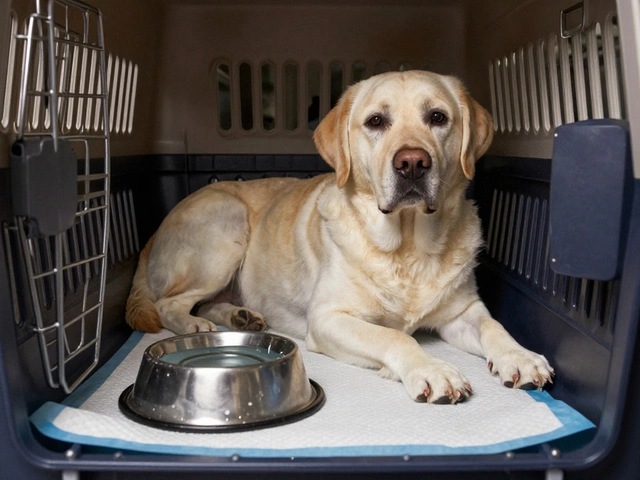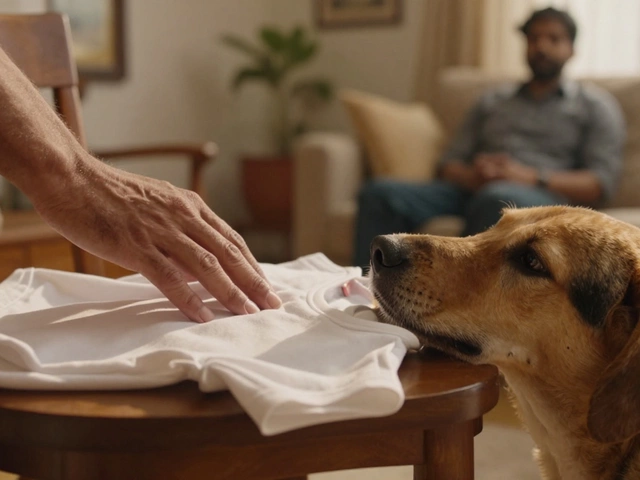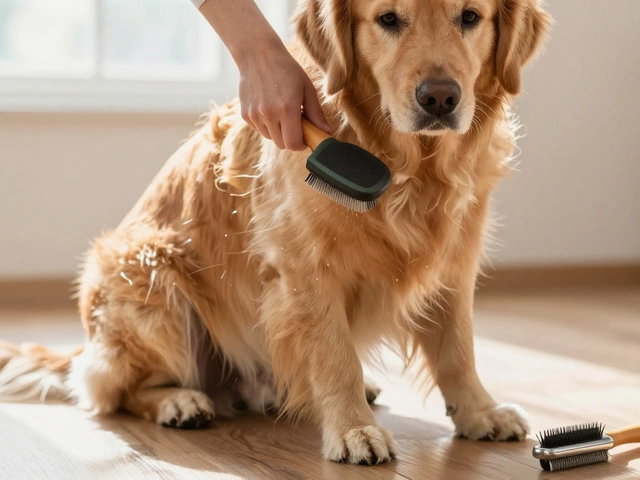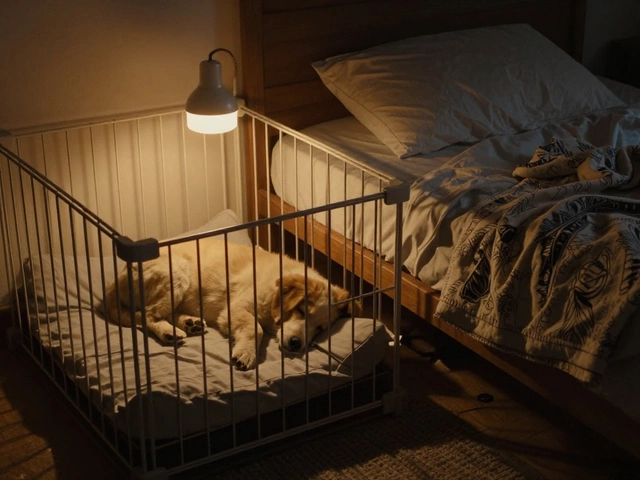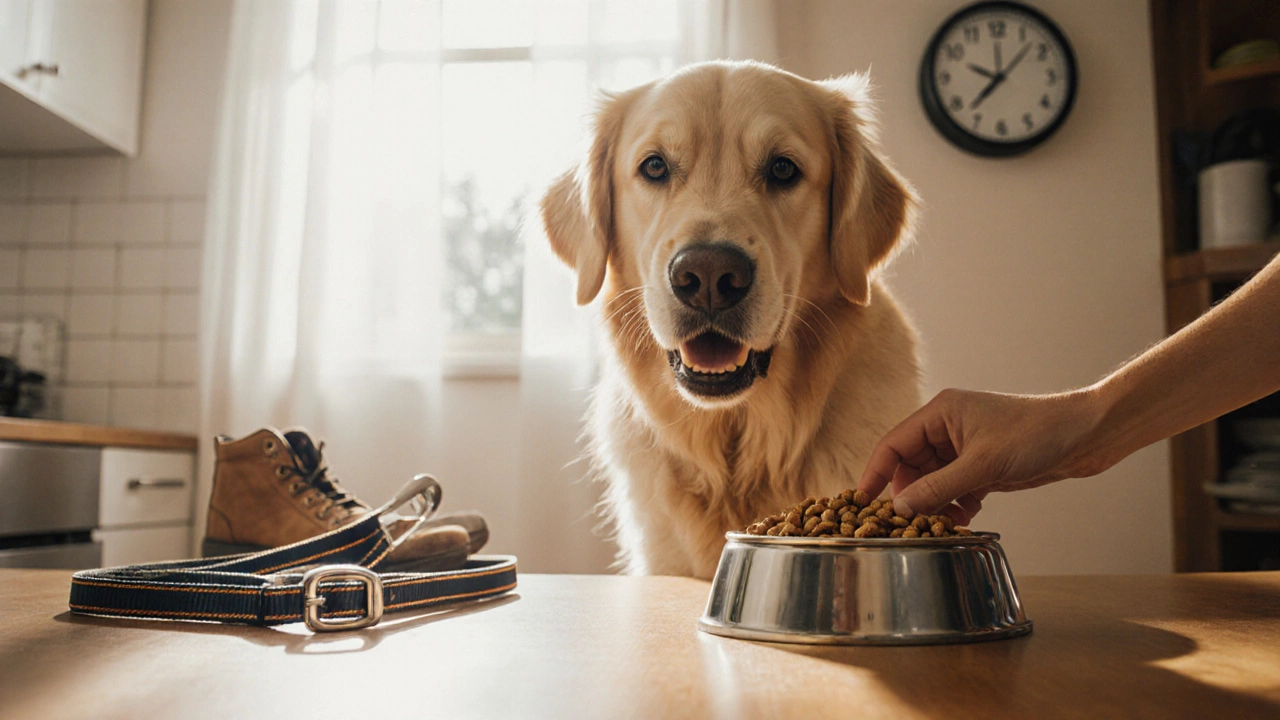
Dog Feeding Schedule Calculator
Your Dog's Profile
Most dog owners wonder when to feed their dog-morning or evening? It seems simple, but the answer isn’t just about convenience. Your dog’s health, energy levels, digestion, and even behavior can be affected by when you serve their meals. There’s no one-size-fits-all rule, but there are clear patterns backed by vet experience and canine biology.
Why Timing Matters More Than You Think
Dogs aren’t humans. Their digestive systems work differently. A dog’s stomach empties in about 4 to 6 hours, which means food sits in their gut for a shorter time than ours. That’s why feeding once a day often leads to hunger pangs, bloating, or even vomiting on an empty stomach. Most vets recommend two meals a day for adult dogs. But when?
Feeding in the morning gives your dog energy for the day. They’re naturally more active after eating, and a full belly helps them focus during walks, playtime, or training. If your dog gets anxious when left alone, a morning meal can reduce separation stress. They’ve eaten, they’re settled, and they’re less likely to chew the couch out of boredom.
On the flip side, feeding in the evening means your dog sleeps with food in their system. That’s not always bad-but it can be risky. Large-breed dogs, especially deep-chested ones like German Shepherds or Great Danes, are prone to bloat (gastric dilatation-volvulus). This life-threatening condition happens when the stomach twists after eating, especially if they drink a lot or run around right after a meal. Evening feeders often let their dogs nap or relax before bed, which helps-but not everyone can manage that routine.
What the Data Says
A 2023 study from the University of Edinburgh tracked over 1,200 dogs across different breeds and lifestyles. The results showed dogs fed twice daily-once in the morning and once in the evening-had better digestion, more stable blood sugar, and fewer behavioral issues than those fed once a day. Dogs fed only in the evening were 37% more likely to wake their owners up at 3 a.m. because they were hungry or needed to go out.
Another analysis from the American Veterinary Medical Association found that dogs fed in the morning had lower stress hormone levels (cortisol) by midday. That’s important if your dog gets anxious during thunderstorms, fireworks, or car rides. A well-fed dog is a calmer dog.
When Morning Feeding Wins
Morning feeding is ideal if:
- Your dog is active during the day-hiking, agility training, or working as a service dog
- You have a busy schedule and can’t get home for an evening meal
- Your dog has a sensitive stomach and tends to vomit bile on an empty stomach
- You live in a cold climate and your dog needs energy to stay warm
- Your dog has diabetes or other metabolic conditions that require consistent insulin timing
Many vets in New Zealand, including those in Auckland, recommend morning feeding for diabetic dogs because it aligns better with insulin injections. A morning meal gives you a full day to monitor for low blood sugar symptoms like weakness, trembling, or confusion.
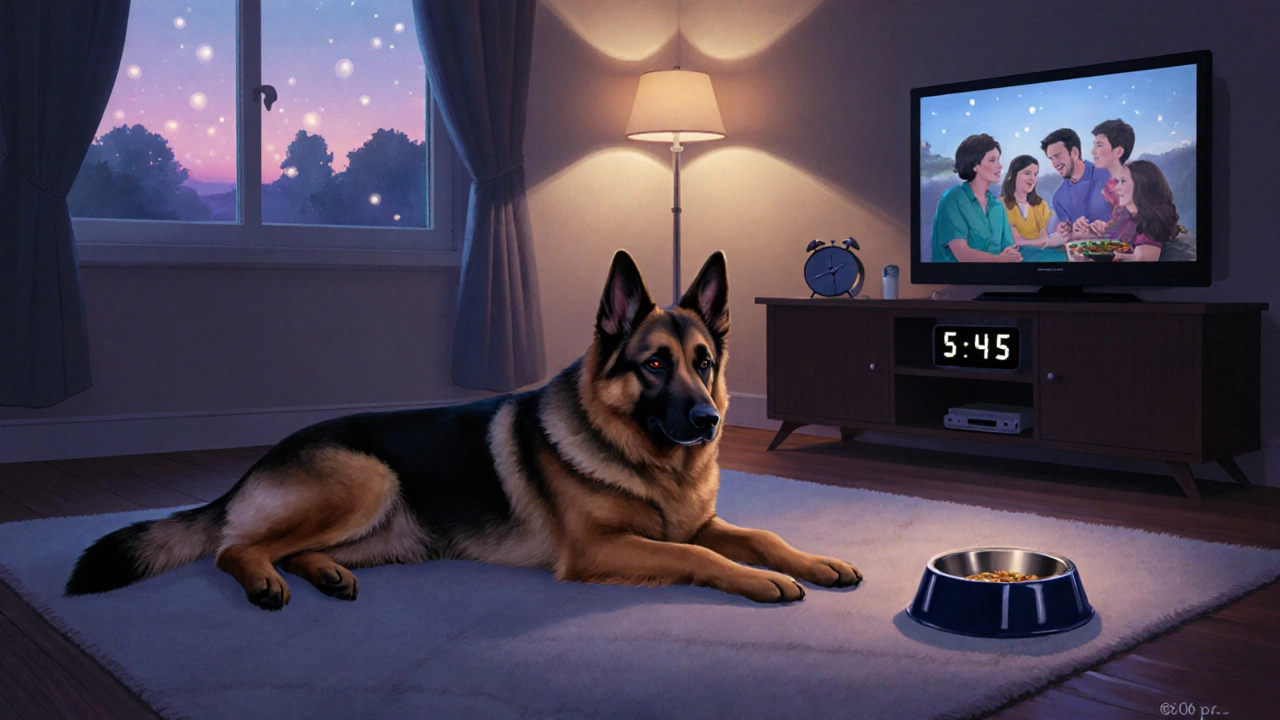
When Evening Feeding Makes Sense
Evening feeding works better if:
- Your dog is older and less active during the day
- You’re home after work and prefer to feed them when you’re around
- Your dog tends to get excited or overstimulated in the morning and needs a calm start to the day
- You’re trying to reduce nighttime accidents-feeding 3-4 hours before bed gives them time to digest and go outside
Some owners swear by evening meals because their dogs sleep more soundly. That’s partly psychological-dogs bond with their owners during feeding time. If you’re home in the evening, feeding then feels like a ritual. And for many dogs, that routine brings comfort.
The Goldilocks Solution: Two Meals a Day
The best answer for most dogs? Two meals. Not too early. Not too late. Just right.
Here’s a simple, proven schedule:
- First meal: 7-8 a.m.-After a walk or light play. This kickstarts metabolism and gives them energy.
- Second meal: 5-6 p.m.-At least 3 hours before bedtime. This gives time to digest and eliminate before sleep.
This timing works for most breeds, from Chihuahuas to Labradors. It avoids the risk of bloat, reduces nighttime bathroom trips, and keeps hunger at bay. If your dog is a puppy, senior, or has health issues, adjust based on your vet’s advice.
What About One Meal a Day?
Some people feed once a day because it’s easier. But unless your dog is a senior with very low activity-or you’re following a vet-prescribed fasting plan-it’s not ideal. One meal means:
- Long stretches without food (18+ hours)
- Increased risk of bile reflux and nausea
- Higher chance of overeating or scavenging
- Less control over portion sizes
There’s no evidence that once-a-day feeding helps dogs live longer or lose weight. In fact, the opposite is true. Dogs fed twice daily tend to maintain healthier weights and better muscle tone.
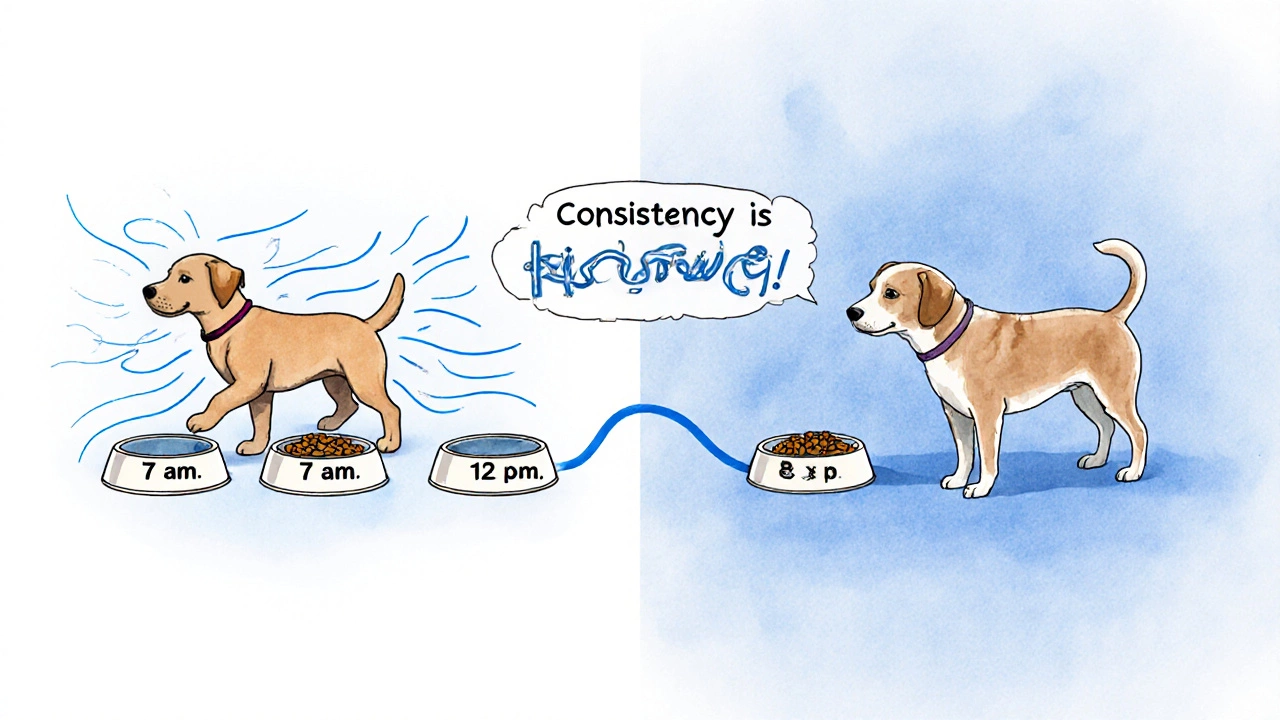
Signs You’re Feeding at the Wrong Time
Pay attention to these red flags:
- Your dog pukes yellow bile first thing in the morning
- They beg constantly between meals
- They wake you up at 3 a.m. whining or pacing
- They have loose stools or diarrhea after eating
- They seem lethargic or overly hyper after meals
These aren’t just annoyances-they’re signals. Your dog’s body is telling you something’s off. Change the timing, check the food quality, or talk to your vet.
Adjusting for Breed, Age, and Health
Not all dogs are the same.
- Puppies (under 6 months): Need 3-4 meals a day. Their tiny stomachs can’t hold much. Feed at 7 a.m., 12 p.m., 5 p.m., and maybe 8 p.m. if needed.
- Senior dogs (over 7 years): May need smaller, more frequent meals if they have arthritis or dental issues. Evening meals help with overnight comfort.
- Working or high-energy breeds (Border Collies, Huskies): Benefit from a morning meal to fuel activity. A light evening snack helps recovery.
- Brachycephalic breeds (Pugs, Bulldogs): Often have trouble breathing after eating. Feed slower, avoid rushed meals, and keep them upright for 20 minutes after eating-no matter the time.
If your dog has diabetes, kidney disease, or pancreatitis, timing is medical. Your vet will give you a strict schedule. Don’t guess.
Final Tip: Consistency Is King
It’s better to feed at 7 a.m. and 6 p.m. every single day-even on weekends-than to switch between morning and evening randomly. Dogs thrive on routine. Their bodies learn when to expect food, when to produce digestive enzymes, and when to signal hunger. That predictability reduces stress and keeps their internal clock running smoothly.
So, morning or evening? The best answer is both. Two meals. At the same time. Every day. That’s the sweet spot for most dogs.
Can I feed my dog only once a day?
You can, but it’s not recommended for most adult dogs. Feeding once a day leaves your dog fasting for 18-20 hours, which can cause nausea, low energy, and overeating. It also makes it harder to spot changes in appetite, which could signal illness. Two meals a day is the standard for good digestion and stable blood sugar.
Should I feed my dog before or after a walk?
Feed your dog after a walk, not before. Walking right after eating increases the risk of bloat, especially in large breeds. Wait at least 30-60 minutes after a meal before going for a walk. If you walk your dog first, wait 20-30 minutes after returning before feeding. This gives their body time to cool down and settle.
My dog wakes me up at 4 a.m. for food. What do I do?
This usually means their last meal was too early or too small. Try moving their evening meal to 6 p.m. instead of 5 p.m., and make sure they’re getting enough calories during the day. Don’t give in to early morning begging-it reinforces the behavior. If they’re still waking up, check with your vet. It could be a medical issue like diabetes or thyroid problems.
Does the type of food affect when I should feed?
Yes. Wet food digests faster than dry kibble, so it may cause your dog to feel hungry sooner. If you’re feeding wet food, you might need to adjust timing or add a small snack later. Dry food stays in the stomach longer, which helps with satiety. Some owners mix both-dry in the morning, wet in the evening-for variety and better digestion.
Is it bad to feed my dog late at night?
Feeding within 2 hours of bedtime isn’t ideal. It can lead to nighttime bathroom trips, indigestion, or disrupted sleep for both you and your dog. Aim to finish eating at least 3 hours before bed. If your dog needs a snack before sleep, make it a tiny piece of low-fat treat-no full meal.

